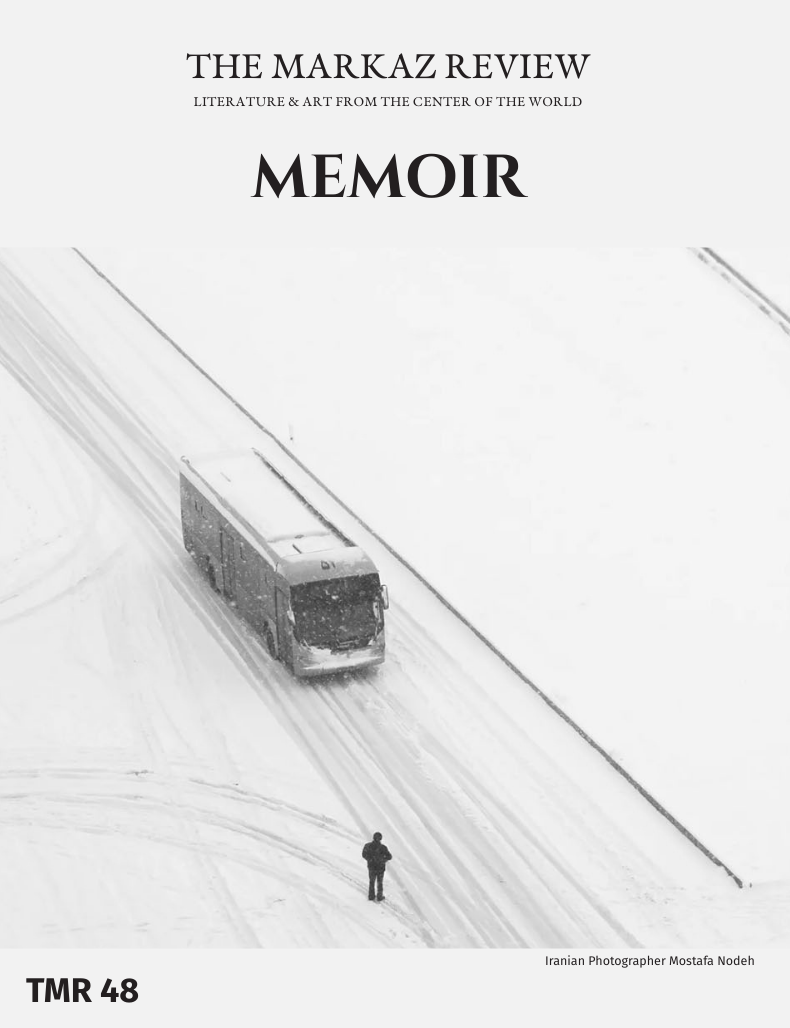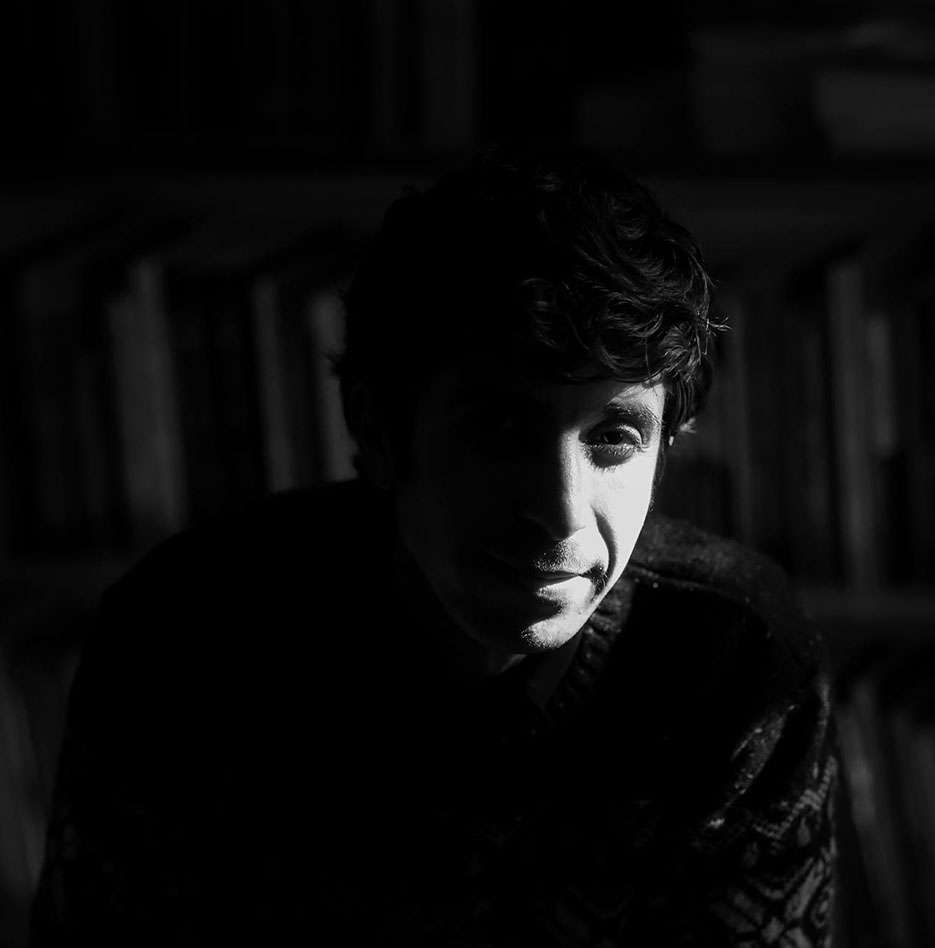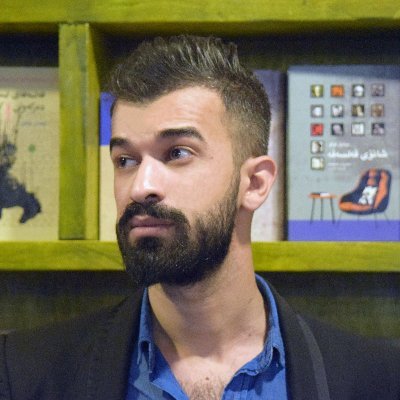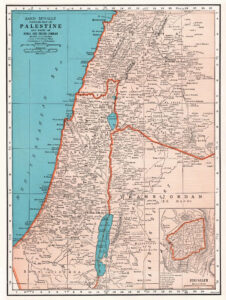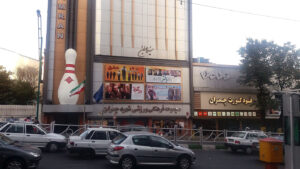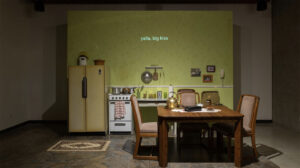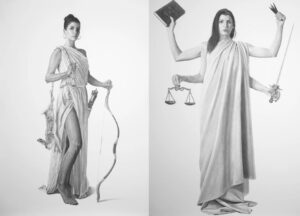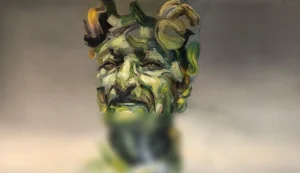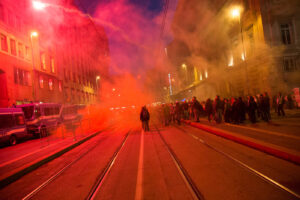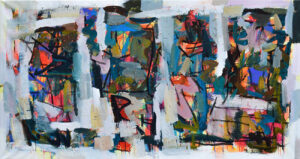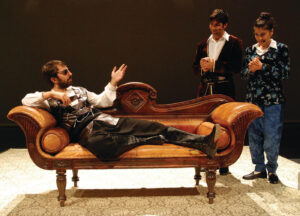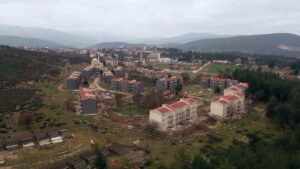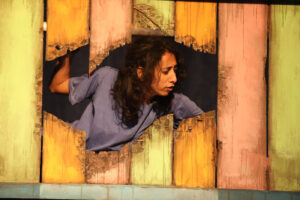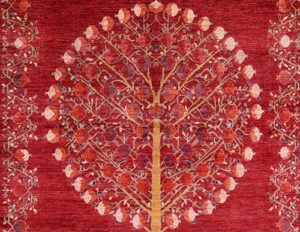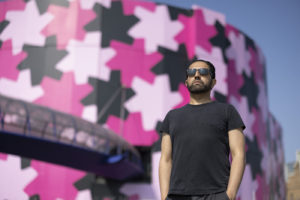Baxtyar Hamasur is a Kurdish short story writer born in Slemani, a city whose streets are named after poets and that has been recognized as a city of literature by UNESCO. Although he has written dozens of literary research articles, he insists, “I am only a short story writer and nothing else.” This is his first short story to appear in English.
For ten years I hadn’t opened the door to that room. I didn’t dare. I was afraid — not of its dust or its musty scent, or of finding spider webs hanging from the walls and corners and ceiling, but of its memories. I had almost begun to believe that the room never existed in the first place, and that with your departure, it had been erased or removed from our home…but it did exist. It was heavy on my mind as much as the rest of the house. Throughout those years, whenever I went to the kitchen, on purpose or for no reason, I walked there, right next to it. The small window of the room, which overlooks the same sink where every day some of my time passes alongside the water that flows down through the sink’s pipe, has been calling out to me in a loud voice. I didn’t believe such a small window could have the capacity to draw me to itself with such intensity, but it has been drawing me and I have avoided it with the same intensity. I rarely drink, and I still don’t have any idea why I was accused of drinking excessively at that time. I didn’t drink at all. Unlike most people who fall into the habit of drinking when they feel lonely, I didn’t, neither back then nor now. Last night, when my hand took the bunch of keys out of my pocket unconsciously and my steps led me straight to the room, I soon found the key and placed it in its keyhole. I rotated it around once and the door opened halfway, creaking and whirring. That’s right: earlier in the evening I had been at a reunion event, which an old university friend had organized, pulling each of us away from our various places and occupations, gathering us together in memory of twenty or so years. I’d drunk two, or let’s say three, glasses of wine, but I wasn’t drunk. I felt more normal than the days when I used to go to the support center for blind people, take notes, watch the movements of the people, and then use these to write the script for a short film called Archive, which you never had the chance to watch.
First Scene
Time: Late in the Day, Place: in Front of a Hospital
A middle-aged man in a suit walks out of a hospital entrance. Above his head, a large sign is hanging. From the text on this sign, we understand that this is a hospital “specializing in eye diseases.” The first thing that catches our attention is his round, magnifying glasses. Like the eyes of a needle, his eyes can barely be seen behind the thick, clear glass of the lenses. It is obvious from his movements and steps that he can’t see the front of his feet well. He lightly walks down the five steps in front of the hospital. He pauses for a while. He looks across the street, and the camera’s gaze shifts to the other side, but it is blurry and out of focus. His frowning face implies that he can’t see anything. He raises his left hand to check the time, bringing it close enough that his watch knocks against the lens of his glasses. We don’t know what time it is, but by the sunlight we know it is evening, a late evening.
Getting together with all those old friends again was both pleasant and unpleasant. For me, it was more unpleasant. There is nothing new in these kinds of gatherings, but it is like rewinding the cassette tape to the beginning, or replaying a phonograph that has fallen beneath a few cardboard boxes of rags in the dusty and forgotten treasury of a large house. No one can escape, but everyone has to join in with telling stories while drinking arak, wine and other drinks. From the beginning, I told them to leave me out, that I’d just listen and join in only occasionally to remind them of certain things. They didn’t accept this. They forced me to recount the time that we first met at an exhibition, then getting to know you while sitting with you in a café, and loving you in secret for two years, then later our marriage and wedding, and moving into this house — a short and sweet three-year life together, the final chapter before your permanent departure. They were by our side on all those days, for all those events and memories, in their hospitality and on some of our trips. When you departed, they were by my side for days, weeks, and months. They consoled my heart, yet they didn’t realize that after you I had nothing left that could be called a heart! Every night, one of them would come to visit me. There in the large front room, which we were supposed to fill with children, they would sit around telling only jokes, trying their best to bring a smile back to my lips. Sometime after your death, not only did I smile, I even laughed! Why should I lie? I burst into roaring laughter! Once, while recording the short film, I even laughed so loudly that the whole cast stopped, stunned, but it was never from the heart. After you, I never had anything called a heart anymore.
Second Scene
Time: Night, Place: Home
The man is sitting alone in a broad room. He has placed his glasses on some sheets of paper beside him. He occasionally raises his head to the ceiling and occasionally hides his face in both hands. He is lost in thought and shakes his head as if he doesn’t understand something. Suddenly he bursts into tears. His weeping gets louder and louder in the room, then he gradually calms down, until he is no longer crying. He is restless and confused. He grabs one of the sheets and his glasses slip down. With his right hand, he raises the sheet of paper to his eye level, as if he intends to pass through it. He searches around himself with fumbling hands. Although the glasses had moved a little farther away, he finds them and places them over his eyes. He looks at the sheet of paper again, carefully and attentively. It falls out of his hand, falling to the floor like waves. He hits his forehead.
Just as the last time you folded and layered them, your clothes are still there, in our wooden wardrobe, untouched. On the very day I decided to close this door forever, I took my clothes to the other room, leaving only my sweater here — that you had knitted for me with your own hands, hiding it for over two months without me noticing while you made it — which I was going to wear it that whole winter, the winter that you departed. That is your long, toweled robe on the hanger. Just as the last time you took a bath, dried yourself with it, came out with it, and hung it there, it is still hanging there. I don’t dare to approach and touch it — not because it is threadbare, but because of the scent of your skin’s moisture and the shampoo and soap you washed yourself with for the last time, which I am certain still lingers after ten years. That is the painting on the wall, a picture of you, drawn by a painter friend, hanging in the same place you chose. The dust of these past years has settled on it. Thankfully, your smile still appears for me beneath the weight of dust. That is the painting of the pregnant woman, a gift from another of our painter friends. Moisture, heat, and cold have distorted the colors. I can’t explain how much you loved that painting, but even more, you wanted to experience that same condition. Those are the curtains, thick and absorbing of light. I told you a window that small, perhaps the smallest window in the world, doesn’t need curtains. You said no, so that our nights and sleep would be more peaceful and quiet. That is the book you placed on that low cupboard and you’d only read 38 pages of it in ten years! Spiders have woven webs around it, and the edges of the pages have turned yellow and black. The book’s author was your favorite, and mine too, who wrote little and still writes little. I am quite pleased with it. I no longer read him, since your departure. Friends would tell me he’s better than ever, which is a pity!
First Shot
Same time and place
The man murmurs. Although no tears can be seen on his face, his voice is wet and crying. “Only one month!” He says, while taking off his glasses and stroking his for-some-days-unshaved beard. “Thirty more days! It means I can only see you for thirty more days!” A short flashback to him sitting in front of the doctor replays: After examining and scrutinizing the results, the doctor tells him, “Your eyes have Choroideremia disease. They are diminishing rapidly, unfortunately. This disease is rare, and the rate of being affected by it is one person in every fifty thousand! You most likely have only one month to see the light and everything else.” The man says, “To hell with the light and everything, but…” The doctor looks at the man with surprise. (The flashback ends.) The man stands up. He walks, feeling with his hands along the wall to a sink, to wash his face. He drinks a little water from the palms of his hands. He searches through the rooms of the house. Here the camera’s gaze should fall blurrily on everything the man sees.
I remember the last moment. I had no idea it would be the last moment and the last time I would see you, otherwise I would have contemplated you more profoundly to keep a permanent image of your unkempt face before my eyes. I was close to you, on a bed — they said there was only a curtain between us — half-conscious and “dented.” Once I became ill, from the epidemic that had spread all over the world and reached my body too, we had just moved into our home — I mean, this house and home, and I laid down saying, “I’m dented!” You laughed and said, “Not dented, but broken. Why are you bereaving the language in this way?” As it happens, during that time I was still stronger than you, although I wish I was not. I recovered and stood back up. They said that I was less affected and that most of the force of the illness had caught you. Life was unfair towards you even in that. You left and I stayed to become a scarecrow, a scarecrow trying to fight away the claws and beaks of life. Later they told me what had happened to you. I didn’t see you. When I was discharged from the hospital, you were no longer here, nor on any span of the earth. Carrying two crutches and with wounds carved on my face and body like letters carved on a tree trunk, how could I visit a patch of land two and a half meters long and half a meter wide, piled and covered with clay and gravel, believing you were laid down beneath it. I imagined you here, in this room at home; I’d get up and return, and you’d be waiting for me here, having cooked me a fragrant dish. You weren’t here; you didn’t have a body, but these things exist in the air here: your scent, your breath, your memories, your images, your clothes, and a book that you have only read 38 pages of.
Second Shot
Same time and place
The man opens a wardrobe door, taking out a large photo album. At first, everything is blurry and unfocussed, gradually becoming clear. The man leans back against a cushion. He takes off his glasses and wipes the lenses with the sleeve of his shirt. He puts his glasses on again. He holds the album up with both hands, close to his eyes. The camera is positioned behind the man’s head. He opens the album cover. He lingers on the first page. There are four spaces for photos, one of which is empty and white where there is a strand of hair shaped like the letter “J” left inside. The camera’s gaze zooms in on a photo of a couple, young and beautiful, slipping into each other’s arms with a smile and tenderness, laughing toward the camera. The camera’s gaze, which is the same as the man’s, moves to the woman, focusing slowly on her, on a wrinkle, a line, a dot on her face, a scratch, a bunch of hair blowing in the wind. Another photo on the same page shows the same woman alone, sitting on a rock next to a small pond. The camera’s gaze slowly and gently moves over her body and face. Another photo on the same page shows the same woman hugging a cat, white with black spots, green eyes, and an open mouth as if it was saying, “Meow.” Again, the camera’s gaze slowly and gently moves over her body and face.
I recognize it. It is a strand of your beautiful hair. I hold it in front of my eyes, twisted and curled, yellowish. It had fallen on the carpet — the carpet you found and we bought after several days of searching from shop to shop – that was black and white, soft and shaggy, with tassels and flowery edges. I said, “Grains of rice, food, tiny dust, and sugar will get caught in it so it will be difficult to clean.” You said, “It is beautiful!” It was beautiful, and it is still beautiful. Luckily, I haven’t seen another one in any other home. Now that I was walking around the room, placing my hands on your handprints on the wall and imagining you, my feet subconsciously sank into the carpet’s tassels, and it wrapped around my big toe, and as I felt it, I sat down, and slowly, slowly removed it: long as a string of a cello. During Winter, you would comb your hair after a bath here and during Summer on the porch. I could see the hairs fall with the comb’s teeth occasionally, and you would gather them into a ball and throw them away. Perhaps it is from our last Winter, as you departed in Winter. Your comb, your wooden comb, should also be here somewhere. We bought it in memory of your grandmother, your mother’s mother, and from the beginning we decided that while decorating our home there should be vintage and antique things alongside new and modern objects. There are. I smell the hair. It is not a lie if I say that this cello-string-like strand contains your whole being inside. I pick it up and take it to the little window ledge.
Third Shot
Same time and place
The man turns the album page by page, lingering at every photo that shows his wife. The camera’s gaze, along with the man’s focus, moves slowly, very slowly, over the photos and the woman’s face. He reaches the last photo on the last page, which shows the same woman. The atmosphere is snowy and she is standing next to a giant snowman, wearing a long black overcoat. From the stiff lines on the shoulders and arms, it looks like she’s just come out from under an iron. She wrapped a red scarf around her neck, snowflakes settled on her hair. She is laughing, and her tiny white teeth can be seen in two rows. The camera’s gaze slowly and gently moves over her body and face. The man quickly closes the album and quickly reopens it, going back to the first photo and he says while looking at it, “Thirty days is not long enough. My only concern is your image fading in my eyes and memory. I want to look at you in such a way that I can keep you in my eyes and memory, in full color, for later and forever.”
The camera is focused on the photos. Gradually the photos darken and the only sound heard is the turning of the album pages.
The End
Before I leave the room, I would like to take something out with me, something special of yours. I walk over to your makeup and beauty kits, wanting to open their lids, but I draw my hand back. I’m afraid you would be sad and offended. I glance around, and you are in every corner, your spirit, your breath. I feel a sense of pressure in my chest. I feel the air becoming gradually harder to breathe, and my heart feels faint. I can’t walk. With a feeble crawl, I manage to reach the door. My gaze quickly lands on the small window ledge. I summon the energy and courage to get up, my clothes still dusty. I walk step by step, with my hands stretched out, span by span, against the wall, and after centuries I arrive. Your hair strand is there, shaped like the letter “J,” like the child we didn’t have but imagined sleeping in his bed as we stood watch over him while he slept, motionless and silent. I pick it up and bring it with me. The bunch of keys is still in the keyhole. As I pull the door handle, making a creaking and whirring sound, the door sticks to the frame. I lock it in a circular motion, lean against the door and slowly, slowly I burst into tears as I fall down.
January 2023
Translator’s Note:
A Pair of Story Glasses—an Introduction to Baxtyar Hamasur
An author is sitting and reading in a room in the Jewish Quarter, surrounded by hundreds of books. His legs go numb, he gets up and reads while walking, his attention is drawn into the depths of the book and his big toe gets caught in the carpet’s tassels. A flash of lightning sinks into his pupils, his vision becomes momentarily dark, he raises his eyes again and sees a strand of hair wrapped around his toe. He stoops and picks it up with his fingertips, a cloudy story starts to become clear in his subconscious and the painting-like letters of his mother tongue revolve in his eyes. The night limps by, and the idea consumes his mind as he tosses and turns in bed. He turns on his laptop at five in the morning and it takes less than three hours to pour the story out. This is unusual for him, because usually he is a writer who writes very little–he has been writing short stories for fifteen years and published only fifteen texts. It only took that lightning strike to capture this story.
Baxtyar Hamasur is a Kurdish short story writer born in Slemani, a city whose streets are named after poets and that has been recognized as a city of literature by UNESCO. Although he has written dozens of literary research articles, he insists, “I am only a short story writer and nothing else.” No one in his family read books. When he was sixteen, his curiosity drew him to the school library. On the advice of the librarian, he read Kalila and Dimna, an Indian narrative in the language of animals. Gradually he bought books but hid them under his shirt as he crossed over into the boundary of his family home, piling them like treasures under his clothes. Before too long, his deeds were exposed and his family showered him with criticism. After years of opposition, his family members — especially his sisters — came to understand his passionate love of reading, even saving his books from the loose hands of visiting children. In 2005, he blackened the surfaces of paper with the emotions of adolescence. Two years later, he published his first texts alongside great writers such as Sherko Bekas, Sherzad Hassan, Bachtyar Ali, Farhad Pirbal and Ata Nahayi in famous magazines.
“Red Bicycle” is the title of his first story, published in a newspaper in the winter of 2010 in Hawler, the capital of the Kurdistan Region. Its origin is the bike shop of Yousef Abaka, the man who first brought the “Iron Horse” to Slemani during the reign of the last king of Iraq, Faisal II — an object that later became known by the western word, “bicycle.”
Baxtyar Hamasur has dedicated his life to stories, even wearing a pair of story glasses. “I see everything as a story,” he relates. “I can’t understand someone or something unless I frame it as a story. I can’t imagine it.” Influenced by Anton Chekhov, Ernest Hemingway, Raymond Carver, Hussein Arif, Hassan Qizilji and Houshang Golshiri, his stories are based on social relationships and Kurdish culture. His works are characterized by intensity and precision. From the author’s own point of view, the story combines demonstration and description, based on language, narrative and worldview. What is most notable is his attention to language. He believes that language is not only a tool for transfer, but also subjective and “dangerous to touch.” Therefore, he has always avoided verbosity and has been tight-lipped with his words. He recently wrote a children’s story, which he described as “quite a difficult experience.”
Before capturing cinematic pictures with his pen, Baxtyar Hamasur bought a Sony camera on credit in 2008 and mostly took pictures of cats. This passion poured onto his paper through the eye of his camera, as cats lurk around the words, between the lines, and inside the paragraphs of all the stories of Ants Walking Beneath the Moonlight. This collection of stories has ants swarming its title, wolves squatting on its cover, begins with chickens clucking, and its last word is a cat’s “meow!”
Like Julio Cortázar’s Casa Tomada, the episodic stories of the Ready: Click! collection narrate the story of an old house, but this one is located south of Slemani city in Kurdistan, built by the hands of Jews before they returned to Israel in the mid-20th century. As long as the author stepped into it, the spirits of the Jews surrounded him, and he felt that the house was brimming with stories that he must tell. During the three years of compiling those three stories, he talked to the elders of the neighborhood and shook down the pages of history to capture a worthy picture. Meanwhile he constantly lived in fear of the old mudbrick house collapsing over him while writing. In this book, which springs from the memories of the city, an educated couple move their home to the neighborhood and fall under the spell of Jewish spirits. The 93-page Ready: Click! was read by countless readers, and twice as many pages have been written about the stories as are contained in the book itself. Kurdish critic Reza Alipour described the density of the stories as “capsule texts,” meaning that they are infused with a lot of energy like pills, and the famous poet Dilawar Karadaghi confirmed this by commenting that the density of the book is like “an unwritten appendix of a thousand pages.”
“A Strand of Hair Shaped Like the Letter J” is an unpublished story by Baxtyar Hamasur and the destiny of its publication in Kurdish is still unknown. It is a narrative of forgetfulness, loss, memory and nostalgia. Its events take place from doorstep to doorstep. Unlocking the door is like opening the door of hell, but the nameless character carelessly plunges into the vortex of memories.
This marks the first time one of Baxtyar Hamasur’s narratives appears in English. From the bottom of my heart, many thanks to the sharp eyes of Hannah Fox, and The Markaz Review for the opportunity to introduce this Kurdish short story writer.
—Jiyar Homer




